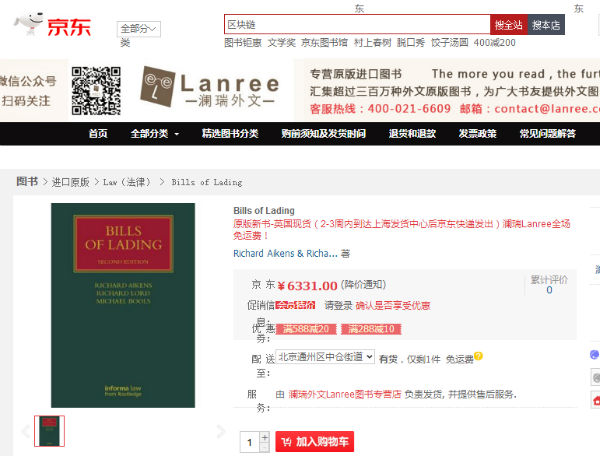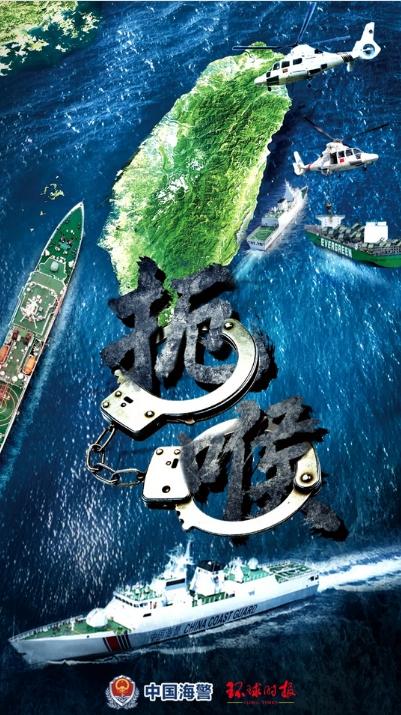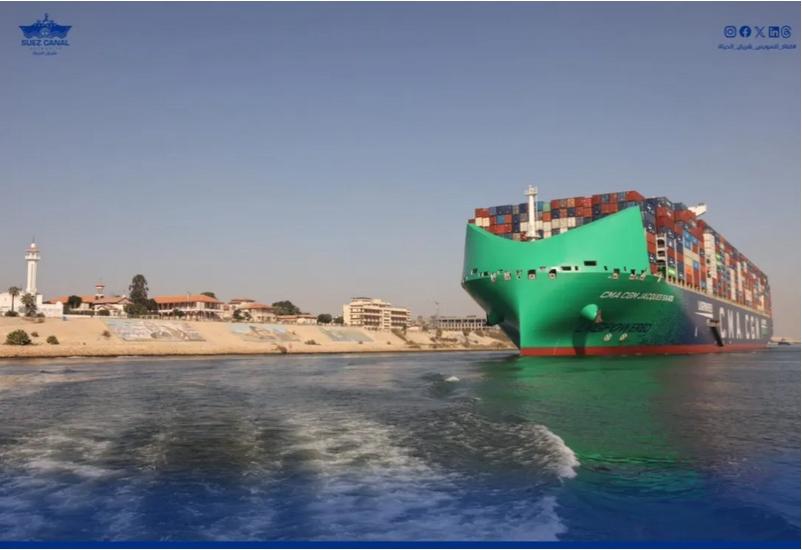Laytime Clauses 装卸时间条款
2.53 This was followed by Pearson J’s decision in Compania Naviera Azuero SA v. British Oil & Cake Mills Ltd, where the earlier cases relating to the meaning of weather working days were reviewed in some detail. In the particular case with which Pearson J was dealing, there had been rain on several occasions during discharge, but this had not delayed discharge because work was not actively in progress at the time. Having considered the alternative arguments that were before him as to whether the reference to weather was exceptive, i.e. a causal connection was necessary between the bad weather and the delay, or descriptive, Pearson J then went on to give his own definition of the phrase:
In my view, a correct definition of a ‘‘weather working day’’ is a day on which the weather permits the relevant work to be done, whether or not any person avails himself of that permission; in other words, so far as the weather is concerned, it is a working day.
In my view, also, the converse proposition must be on the same basis. A day is not a weather working day, it fails to be a weather working day, in so far as the weather on that day does not permit the relevant work to be done, and it is not material to inquire whether any person has intended or planned or prepared to do any relevant work on that day. The status of a day as being a weather working day, wholly or in part or not at all, is determined solely by its own weather, and not by extraneous factors, such as the actions, intentions and plans of any person.
The judgment continues by pointing out that such an interpretation avoids the obvious absurdity that a day on which the weather consists of continual storms of rain, snow and sleet, would be counted as a weather working day if nobody had planned to do relevant work on that day.
2.53 这种观点曾被 Pearson法官在 Compania Naviera Azuero SA v. British Oil Cake Mills Ltd—案中的判决所遵循。在该案较为详细地回顾了涉及良好天气工作日之含义的那些较早的案例。在Pearson法官审理的那个具体案子里,卸货期间曾经下过几次下雨,但是这并没有延误卸货作业,因为当时作业进展缓慢。在考虑了当时摆在他面前的两种可供选择的争论点之后,即关于对天气的引证究竟是除外性的(亦即坏天气与延误之间是必然的因果关系)还是说明性的,Pearson法官提出了他自己对这一短语所下的定义:
依我之见,‘良好天气工作日’的正确定义是,天气容许从事相关作业的日子,而不论人们是否利用了这种容许的机会;换言之,仅就天气而论,它是一个工作日。
还有,我认为,相反的主张也必须建立在同样的基础之上。就那一天的天气而言不允许从事相关的作业,那一天就不是良好天气工作日,它也不能成为良好天气工作日,而查究某人是否已经打算或者计划或者准备在那天从事某一相关的作业则并不重要。一个日子,其全部或部分或根本不是良好天气工作日的状态完全是根据该日的天气情况来确定,而不是根据诸如某人的行为、意图和计划之类的外部因素来加以确定。
该判词进一步指出,这样的解释避免了某种明显的谬误,即当某一天的天气状况是连续的暴风雨、暴风雪及雨夹雪时,如果没有人计划在那一天从事相关的工作的话,那么这一天还将被算作是一个良好天气工作日。

2.54 In the Reardon Smith case, Lord Devlin said:
It is well established that whether a day is a weather working day or not depends on the character of the day and not on whether work was actually interfered with. The authorities on this point have recently been reviewed by Mr Justice Pearson in Compania Naviera Azuero SA v. British Oil & Cake Mills Ltd and others [1957] 2 QB 293; [1957] 1 Lloyd’s Rep 312, and neither side challenged the correctness of his decision.
2.54在Reardon Smith 案,Devlin勋爵说:
这已经确立下来:某一天是不是良好天气工作日取决于那一天的天气特性,而不是取决于工作是否实际受到了干扰和阻碍。最近,Pearson法官在Compania Naviera Azuero SA v. British Oil Cake Mills Ltd and others (1957年王座法庭案卷第2卷第293页,1957年劳氏法律报告第1卷第312页)一案中已经审查关于这一问题的判例,还没有一方对他的判决的正确性产生质疑。
2.55 It sometimes happens that weather may prevent a vessel getting into berth or when it is in berth may force it to leave. In the former case, provided the vessel has become an Arrived ship or is deemed to be so by an additional clause, then time will begin to run. Under general principles applicable to any fixed laytime provision, time will then run continuously in the absence of any provision to the contrary or default of the vessel. Where the laytime allowed is measured in weather working days, then during the period the vessel is waiting for a berth (whether the delay is due to weather or congestion) time will count except for any periods during which loading or discharging would not have been possible due to weather had the particular vessel been in berth.
2.55 有时会发生天气可能会阻止船舶靠泊或者当它已在泊位上时可能会迫使它离开的情况。在前一种情况下,只要该船已经成为到达船舶,或者根据附加条款的规定它已被视为到达船舶,那么时间就会开始起算。根据适用于任何固定装卸时间条文的基本原则,在没有任何相反的规定或者船方违约的情况下,时间将连续计算。如果所允许的可用装卸时间是以良好天气工作日来计量的,如果已有特定具体船舶靠在泊位上,且将由于天气原因不能够进行装货或卸货作业的那段时间扣除之外,船舶在等泊期间的(无论这种延误是由于天气原因还是港口拥挤造成的)时间将予以计算。
2.56 The effect on laytime measured in weather working days of a vessel having to leave her berth because bad weather was expected was the question considered in Compania Crystal de Vapores v. Herman & Mohatta (India) Ltd (The Maria G). The ship concerned, the Maria G, was ordered to move off the berth to buoys by the harbor master because a ‘‘bore tide’’ was expected and the master feared possible damage to the jetty and the vessel.
2.56由于预期到来的恶劣天气船舶不得不离开她的泊位从而产生对以良好天气工作日来计量的装卸时间的影响,这一问题曾经在Compania Crystal de Vapores v. Herman Mohatta (India) Ltd (The Maria G)—案中被研究讨论过。因为预期会发生‘怒潮’,港务局长担心会对突堤码头和船舶造成损害,该案所涉及的船舶,即Maria G轮,被港务局长命令离开泊位而去系浮筒。

2.57 In his judgment, Devlin J (as he then was) assumed, without deciding, that a ‘‘bore tide’’ was weather. He then went on to hold that the expression ‘‘weather working days’’ could not be construed so widely so as to cover the circumstances of this case, in that, if the effect of weather was not to interfere with the operation of loading but to render the berth unsafe, the time so lost was not what the parties contemplated when they referred to weather working days.
2.57 在他的判词中,Devlin法官(当时他还是高等法院的法官)曾假设,但却没作判决‘怒潮’是属于天气的范畴。他接下来判定,‘良好天气工作日’这种措辞不能被如此广泛地解释以致于覆盖了本案的情况。其中,如果天气的影响不是妨碍了装货作业的进行而是使那个泊位成为不安全的,那么,如此所损失的时间就不是合同双方当初谈到良好天气工作日时他们所预想的那样了。
2.58 Where weather first stops loading and then forces a vessel to leave its berth, then time will not count against laytime measured in weather working days from the time weather stopped until the weather improved sufficiently so as to allow loading or discharging had the vessel been back in berth. It matters not that the weather does not actually allow the vessel to return to its berth—the question is simply would loading have been possible if the vessel was back in berth.
2.58当是按照良好天气工作日来计算装卸时间时,如果天气首先是使装货作业停止,然后才迫使船舶离开其泊位,则从天气中断作业时起,如果该船已经返回其泊位,直至天气足够变好以至于允许进行装货或卸货时止这段时间就不能计算在装卸时间之内。至于实际上那种天气并不容许船舶返回其泊位¬,简单地说,如果船舶能够回到泊位,装货是否可能进行这一问题,则与她不再有关系。
《装卸时间与滞期费》购买链接(点击可购买)

公益出版译著《Aikens on bills of lading》第二版中英文对照,筹款链接(可点击进入)
海运圈聚焦专栏作者 魏长庚船长(微信号CaptWei)

 2018-04-10
2018-04-10 1081
1081 














